Group B Strep: ‘A common bug could have killed my baby’
- Published
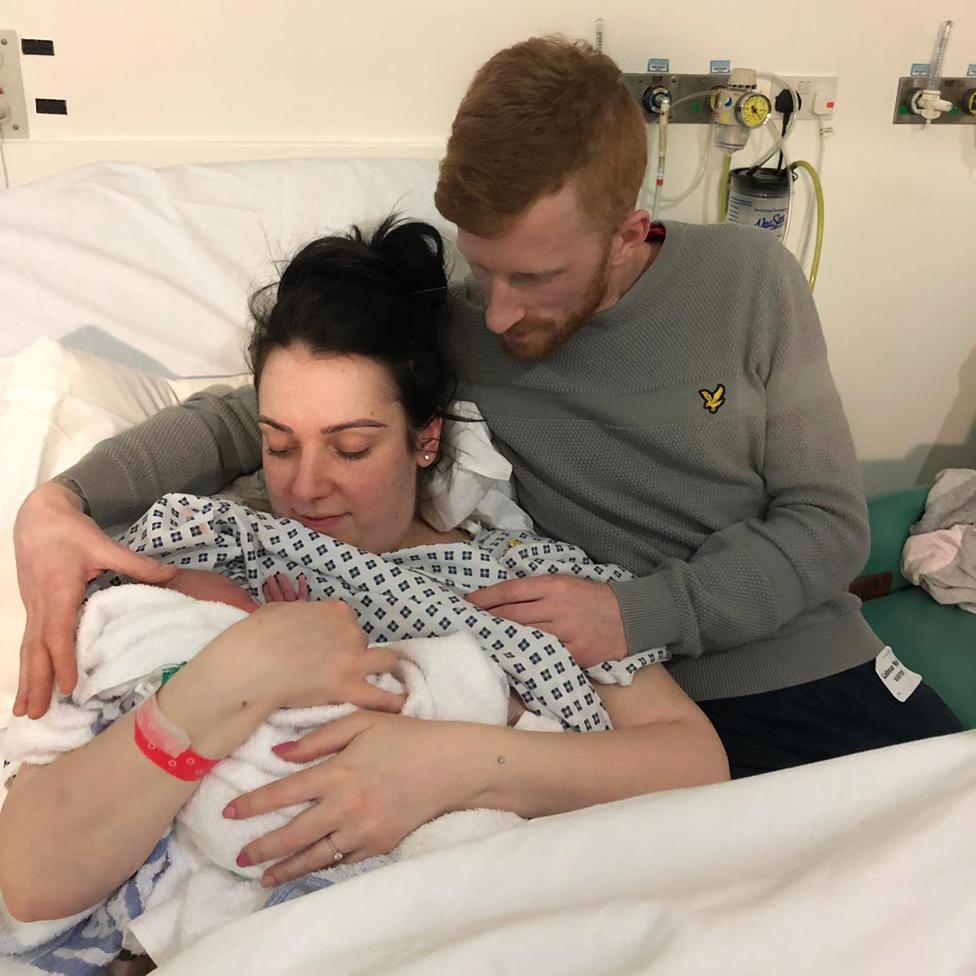

The mother of a child who developed meningitis and sepsis because of a bacterial infection called Group B Strep is calling for all pregnant women to be tested for it. Currently the test is only available privately - and some women are still not being told about the potential threat the bug poses to their baby.
Bethany Rashley had a straightforward pregnancy until 33 weeks, when she experienced possible labour pains and noticed her baby was moving less than it had before. She went into Kettering General Hospital, was kept in for a few days, and then sent home.
There was no improvement in the baby's movements, however, and at 39 weeks Bethany went back to the hospital with her partner, Andy Halcrow, to be induced.
"I think they weren't happy, his growth had slowed a little bit as well, and they just decided he was ready to come," says Bethany.
Arthur Halcrow was born at 07:58 on 1 March 2019. An instrument called a ventouse suction cup had to be attached to his head to help with the delivery.
"When he was born he was brilliant," says Bethany. "He was screaming, he was lovely and pink. His temperature was good. All of his signs were really good."
It was on the postnatal ward that Bethany started to realise something wasn't right.
"In the afternoon, he was sort of making this funny grunting noise," she says.
Bethany mentioned it to a midwife, who said she would get the doctors to take a look at Arthur, but by late afternoon he had settled down and it no longer seemed necessary. Overnight Arthur didn't feed as much, but staff were not especially concerned - they thought the suction device used on Arthur's head during the birth might have given him a headache.
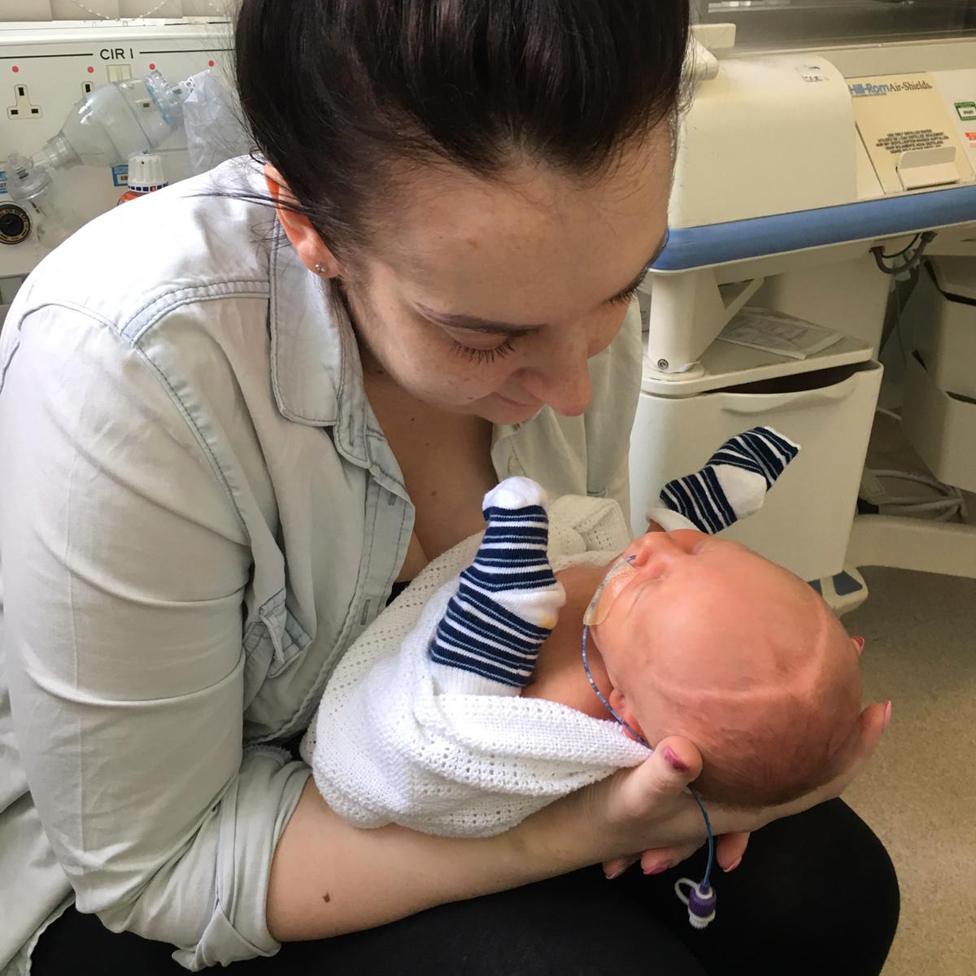
At 06:00 Bethany got up ready to feed and change Arthur.
"He just started this screaming," says Bethany, "and it was this really high-pitched, real scream. I hadn't heard anything like it."
For the next few hours, Arthur just would not settle.
"I'd pick him up and it was like he was being electrocuted, he was jerking everywhere. Every time I touched him, it was like he was in such pain, but then I'd put him down and he'd want to be close to me again. I just didn't know if this was normal. It was my first baby, I had no idea."
As the day progressed, Bethany and Andy became increasingly worried.
"Even when he was asleep he was still whimpering, and his breathing just didn't seem right at all," says Bethany.
His tiny fingers and toes had turned purple and the skin all over his chest was mottled.

What is Group B Strep?
"Group B Streptococcus (GBS) is a common bacterium that can live in our bodies and which usually causes no harm," says Dr Pat O'Brien, consultant obstetrician at University College London Hospitals.
It is carried in the vagina or rectum of 20-40% of women in the UK, he says, so many babies come into contact with it when they are born. Usually this doesn't matter - only a small minority of babies develop an infection.
A surveillance study carried out between April 2014 and April 2015, external, found that one in every 1,750 babies born in the UK and Ireland developed an "early-onset" GBS infection (in the first six days of life). Of these, 5% died and 7% were thought to have been left with a "major, minor or possible disability", including brain damage, cerebral palsy, deafness, blindness or learning difficulties.
The study recorded 53 GBS deaths over the year, in babies less than 90 days old - roughly one per week.

At about 16:00, a registrar checked Arthur and noticed that he was also sucking his chest in under his ribcage. He was transferred to the special care unit and and a sample of his spinal fluid was taken.
"They did loads of blood tests, gave him some more paracetamol just to try and calm him down and he sort of seemed to relax," says Bethany. "It was like he knew he was getting help."
The medical team started to ask Bethany lots of questions. Had she heard of Group B Strep (GBS)? Had she had a swab done, and had she had any infections when she was pregnant?
The results of Arthur's tests weren't due back until the following day, but at 21:00 a doctor from the pathology lab called to express concern about the amount of GBS bacteria that had already been grown from Arthur's spinal fluid. He clearly had an infection.
It was also confirmed that Arthur now had meningitis and sepsis - a dangerous blood infection - so he was put on antibiotics. He was breathing for himself but Bethany and Andy were warned that he may need to be ventilated if he didn't improve quickly. A member of staff then asked if they had any questions, and Bethany asked if Arthur would be OK.
"She couldn't look at me, she just put her head down and she said, 'It's not something we can answer, just spend as much time as you can with him.'
"I thought, 'This isn't right, we were supposed to go home today, I don't understand how now we're being told that he might not come home.'
"We'd got everything ready at home for us to walk in. We'd set the little Moses basket up and we'd got all the bottles and everything ready for him and I just thought, 'I can't go home without him.'"
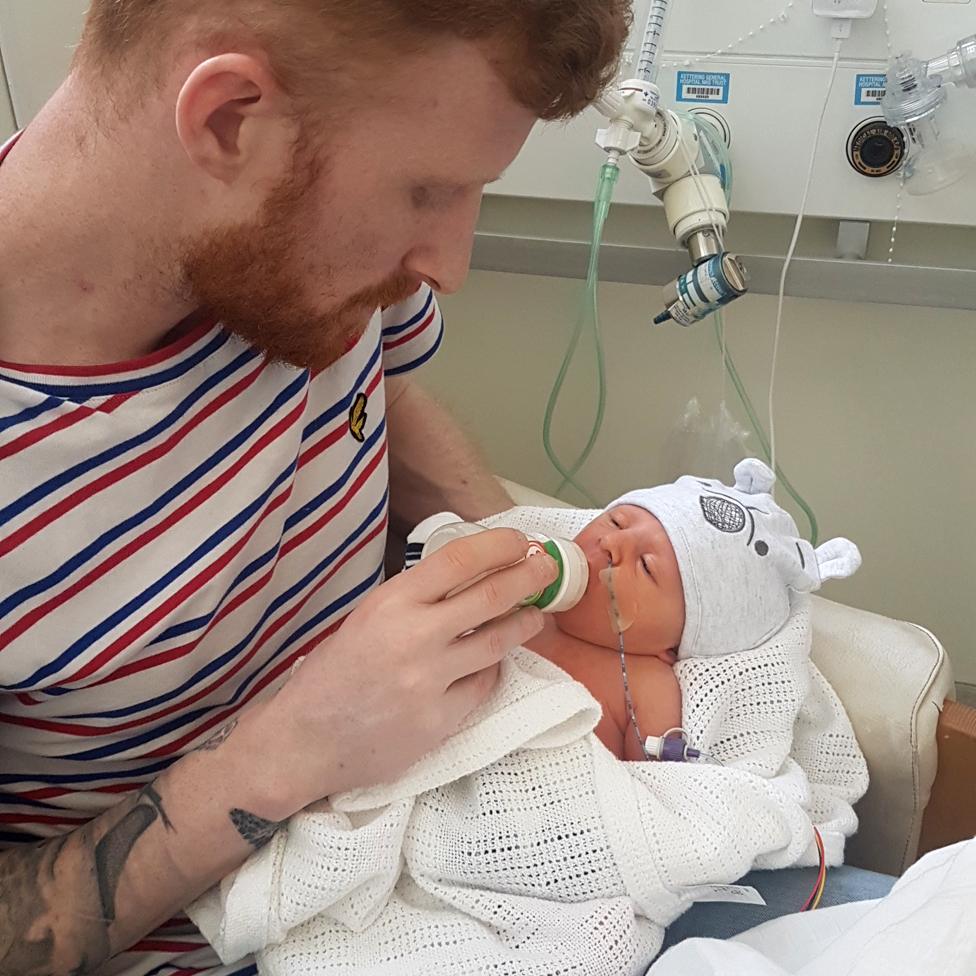
Bethany and Andy were able to stay in a parent room next to Arthur's room. They witnessed as, the next day, he became floppy and unresponsive - and was moved into an incubator.
"It was awful, it just made everything ache," says Bethany.
Over the next few days they could only watch and wait.
"We still hadn't let our family come and see him," says Bethany. "We were just so worried, and in a way I wanted to protect them. It sounds really morbid, but I didn't want them to get to know him if he wasn't going to make it. I wanted to stop them from being hurt, I guess."
By day five Arthur's blood test results were much more positive and he was very alert. The danger appeared to be over. But then the medical staff discussed the possible long-term effects of meningitis.
"They mentioned cerebral palsy and I thought, 'Oh my God, he's gone through all of this and he's then going to have a severe disability,'" says Bethany. "So they were telling us signs to look out for and then they said blindness and deafness were also really common with meningitis."
At the end of the week Arthur had made such good progress that he was allowed to stay in Bethany and Andy's room and by day 14, the family were finally able to go home. Before they left, Arthur had a full health check and seemed to be well. Later he also had a special hearing test, but fortunately everything was OK.
Bethany says she wishes she had been warned about GBS - and thinks all pregnant women should be tested for it.

Signs of GBS infection in newborn babies:
Grunting, noisy breathing and working harder to breathe
High or low temperature and skin feels too hot or cold
Unresponsive or sleepy
Abnormally slow or fast breathing and/or heart rate
Not feeding properly
Crying or irritable
Changes in skin colour such as blotchy skin
Source: NHS and Royal College of Obstetricians and Gynaecologists

At present, if it's known that a pregnant woman is carrying the GBS bacterium, she will be offered an antibiotic drip during labour, which usually prevents the baby developing an infection.
The drip is also offered to pregnant women on the basis of the following risk factors:
Fever during labour
A previous child developed a GBS infection
Giving birth prematurely (at less than 37 weeks)
The catch is that it's generally not known who is carrying GBS. Occasionally it is discovered by chance, when a woman is tested for another symptom, such as a suspected urine infection. Some women also pay to have a test known as an Enriched Culture Medium test carried out privately. But there is no routine screening.
The charity Group B Strep Support has long argued that all women should be screened, but in 2017 the UK National Screening Committee decided against this step.
Their argument was that it would result in "many thousands of women receiving antibiotics in labour when there is no benefit for them or their babies, and the harms this may cause are unknown".
In most cases there would be no benefit, because even when a woman is carrying the bacteria it's rare for her baby to develop an infection. So what are the possible harms?
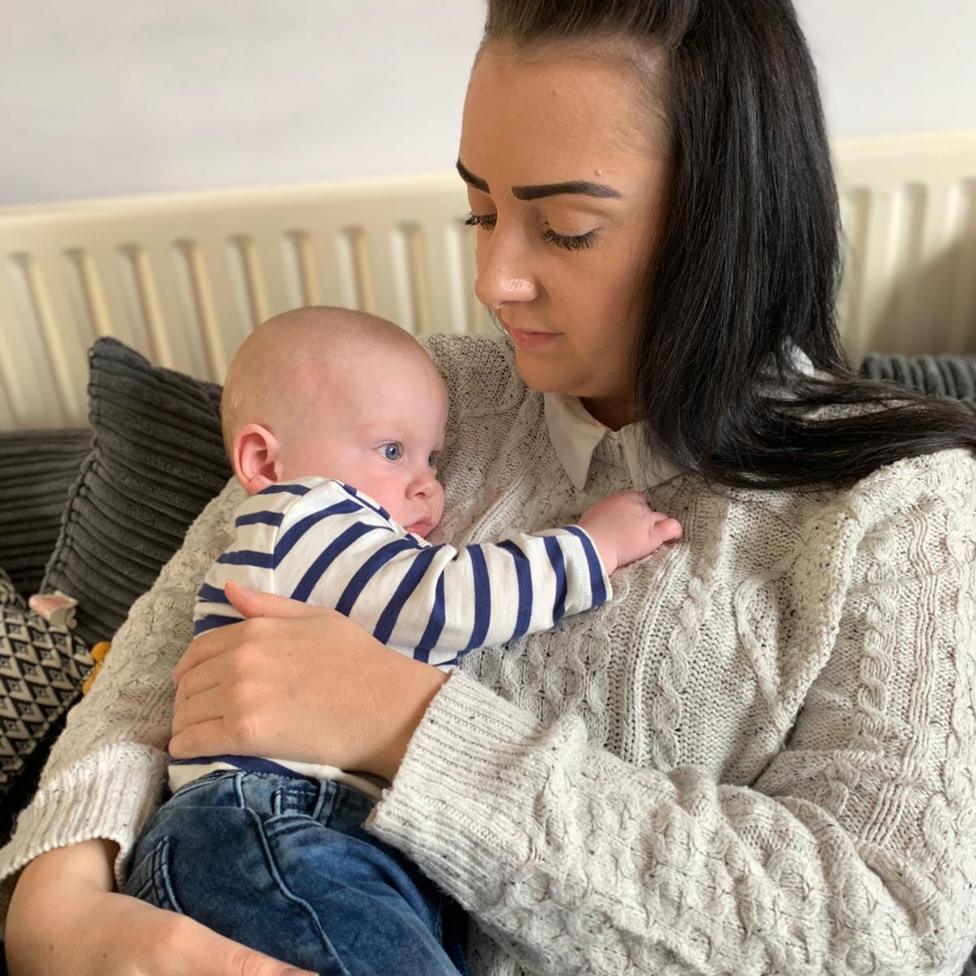
According to Prof Peter Brocklehurst, professor of women's health at the University of Birmingham, one is that the mother can have an allergic reaction to the antibiotics, though he concedes that this is very rare. Another is that receiving antibiotics at birth has a "major impact" on the growth of bacteria in the baby's digestive tract, or "microbiota".
"We increasingly think that these are really, really important for the development of the baby's health and well-being," he says.
"When a baby is born it has no bacteria in its gut. If it is born vaginally, it will pick up organisms from the mother's birth canal and around that area, and if it's born by caesarean section it often picks up a lot of the skin organisms from the mother, and these begin to colonise the baby's gut."
Babies born by caesarean section are more likely to develop asthma and eczema and certain other allergic conditions, and this may be because of differences in their gut bacteria, Brocklehurst says. The use of antibiotics, he suggests, could have even more far-reaching effects.
"There's that uncertainty, therefore, about treating many hundreds of thousands of women with antibiotics to potentially prevent a few cases of Group B Strep sepsis, with balancing that against the potential long-term harms of disrupting all of these babies' microbiota at birth."
Public Health England told the BBC it had been estimated that between 1,675 and 1,854 women giving birth at 37 weeks or later would need to be treated with intravenous antibiotics in labour to prevent one case of early-onset GBS, and that between 24,000 and 32,000 would need to be treated to prevent a death.

Further help and information

Group B Strep Support says it has not been demonstrated that antibiotics during labour are bad for the baby's health. It also points to countries where screening for GBS has been introduced - such as the US and Australia, France and Spain - where it is claimed that the incidence of GBS infections in newborns has fallen by between 71% and 86%, external. In the UK, by contrast, the number of babies developing early-onset GBS infection increased by 42% between 2003 and 2017, external.
"When you look at the rates of Group B Strep infections in the UK and how they've increased over time - whereas in countries where they test routinely those rates have gone down, and have stayed down - I think it's absolutely devastating that clearly we have babies who are suffering from avoidable Group B Strep infections," says Jane Plumb, the charity's chief executive.
"Some of those little ones are sadly dying or recovering and being left with disability as a result of their infection, when actually if we'd had a different prevention strategy then that should not have happened."
Peter Brocklehurst doesn't think the figures from these other countries can be taken at face value, however. The method of testing for an infection is to take a small sample of blood and to attempt to grow a culture of the bacterium, he points out. If the baby's blood contains antibiotics, the culture will not grow, he says, but the baby may nonetheless have an infection, and could still die of it.

Work is currently under way which may help resolve the debate over screening. Brocklehurst is involved in projects that attempt to determine whether receiving antibiotics at birth leads to health problems for the child five or six years later.
In addition, this May the government announced funding of £2.8m for a clinical trial, external that will compare outcomes for the babies of three groups of pregnant women: one treated under the existing risk-based approach; another that is given an Enriched Culture Medium test for GBS at between 35 and 37 weeks of pregnancy; and a third that is tested for the bacterium at the start of labour with a machine called GeneXpert. The trial was given ethical approval by the Health Research Authority in England and Health and Care Research in Wales on 1 November, but results are not expected for three or four years.
Bethany did not have any risk factors for GBS. She says she and Andy first heard about it on the television programme, This Morning, in January of this year, when former Olympic sprinter Iwan Thomas described how he had almost lost his newborn son, external because of a GBS infection.
"We were horrified," says Bethany. "We thought, 'We're nearly coming to the end [of the pregnancy] and we haven't even heard of this.'"
After watching the report, Bethany says she got her pregnancy pack out and went through the various leaflets, but she hadn't been given one about GBS. At her next midwife appointment Bethany asked a question about it, but says she was told it was nothing to worry about.
By now, though, all pregnant women should be receiving information about the risk of infection.
Two years ago (at the same time as recommending that all women giving birth prematurely should be offered antibiotics during birth) the Royal College of Obstetricians and Gynaecologists (RCOG) changed its guidelines to recommend that all pregnant women be provided with an information leaflet, external, co-authored by experts at the RCOG and the charity, Group B Strep Support.
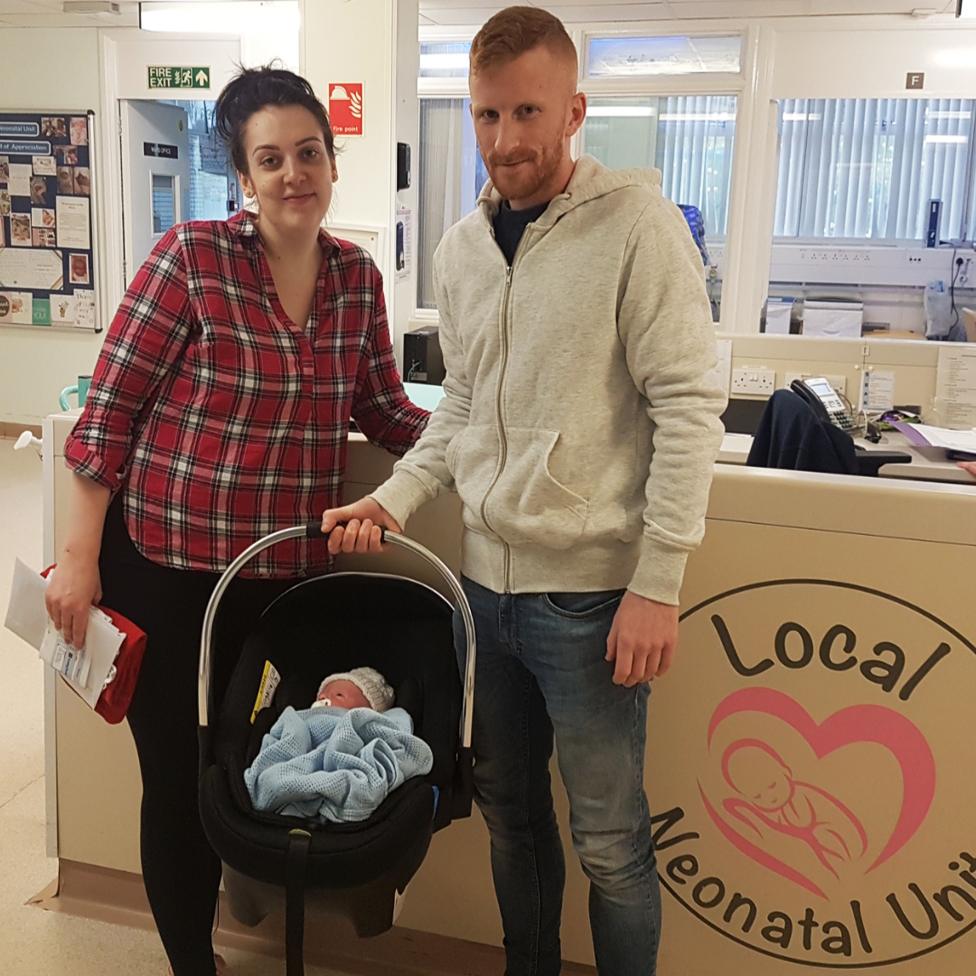
Jane Plumb, the charity's chief executive, says that from conversations she and her colleagues have had with pregnant women and midwives, it's apparent that these leaflets aren't being given routinely to all pregnant women at all hospitals.
The leaflets are provided to hospitals free of charge, she says, so cost is not a factor. The explanation, she thinks, is that "a number of the trusts, a number of the hospitals, haven't yet updated their Group B Strep prevention guidelines in line with all of the college's last updated recommendations".
"I wish I'd just stuck to what I thought and ordered the test myself," says Bethany. "And that's something that I'm always going to regret not doing."
Kettering General Hospital's head of midwifery, Mara Tonks, said the hospital took the potential for GBS infections seriously and would find out "why a delay may have occurred for Arthur's diagnosis", to ensure lessons were learned and practices improved.
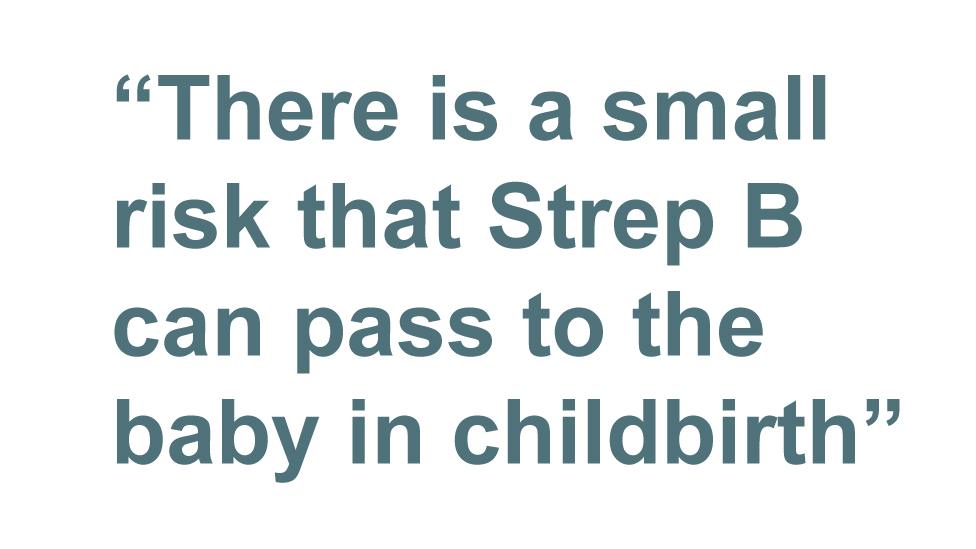
She said the RCOG information sheets on GBS were included in the booking packs given to mums as soon as they registered, and that the hospital also directed them to educational information provided by the Mums and Midwives Awareness Academy (Mama).
She added that the hospital had protocols in place to treat any confirmed infections, while pointing out that most pregnant women who carry GBS bacteria go on to have healthy babies.
"There is a small risk that Strep B can pass to the baby during childbirth causing serious complications and this is something our midwives and maternity doctors are always looking for," she said.
"If a baby becomes unwell after birth we would investigate possible infections or complications as soon as possible and act immediately on diagnosis. On the rare occasions where clinical diagnosis is delayed we would do our utmost to commence appropriate treatment immediately on diagnosis."
Announcing last month that the GBS trial had been given ethical approval, health minister Nadine Dorries said: "I'm determined to do everything I can to raise awareness and help protect mothers and their newborns from the devastating impact this infection can have. We want the NHS to be the safest place in the world to give birth and this trial will be an important step in understanding if universal screening of Group B Strep can save the lives of more babies."
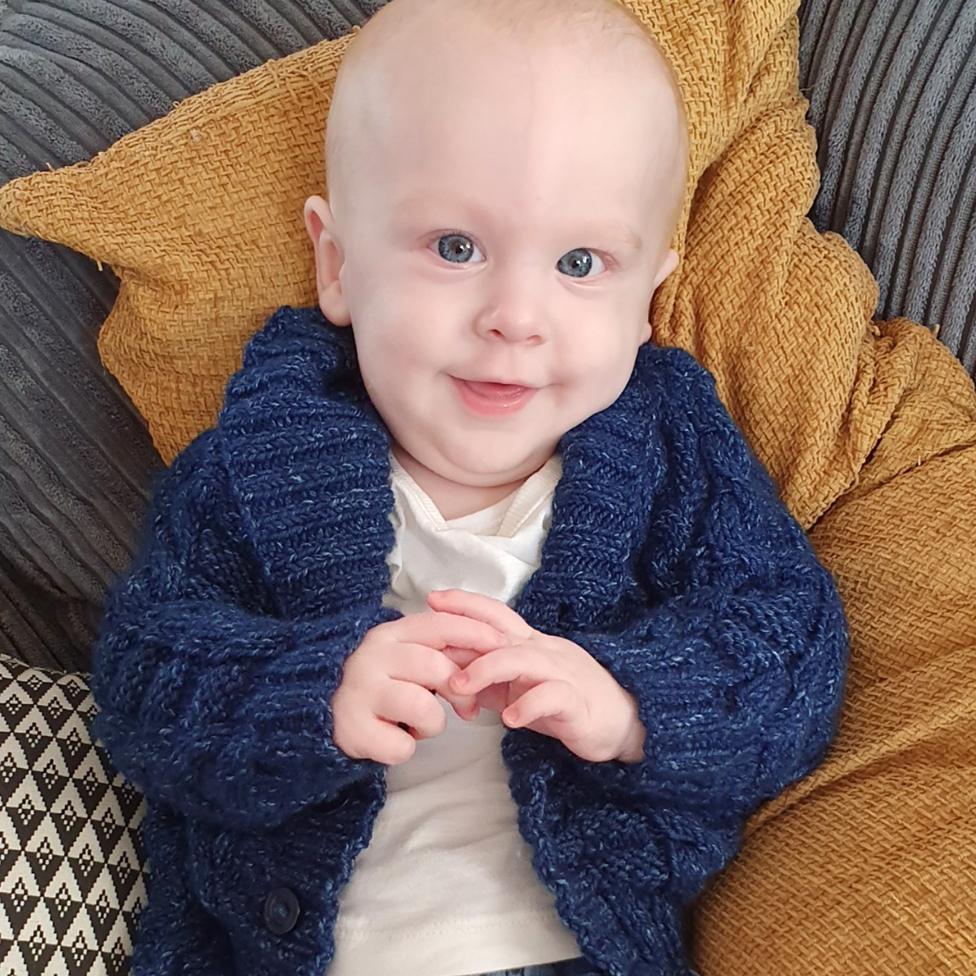
Arthur is now thriving and has one more final appointment before he will be given a clean bill of health.
"When he was three months we saw the consultant that had looked after him and he did a double take, he couldn't believe it was the same baby," says Bethany. "He was gobsmacked, and he did say to us, 'After I'd met Arthur I went home and it made me give my kids an extra squeeze, because we just didn't know what was going to happen with him.'"
Bethany doesn't want anyone else to experience what her family has been through.
"I really feel like the swab should be offered during pregnancy or tested as part of the admission process on a labour ward," says Bethany. "The cost of the test to the NHS is nothing compared to how much it cost them to treat Arthur over his two-week stay."
You may also be interested in:
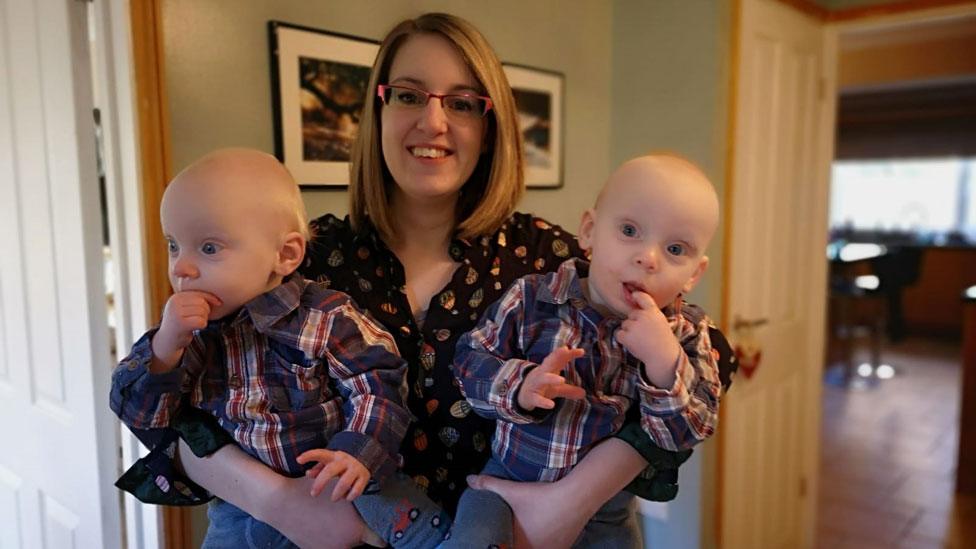
When Stephanie Elderton's twin boys caught a cold, she never imagined that one of them would end up in intensive care. But the cold developed into bronchiolitis - and while bronchiolitis is usually a mild illness, in rare cases it becomes serious.
Bronchiolitis: 'I thought it was just a cold at first'
Join the conversation - find us on Facebook, external, Instagram, external, YouTube, external and Twitter, external.
